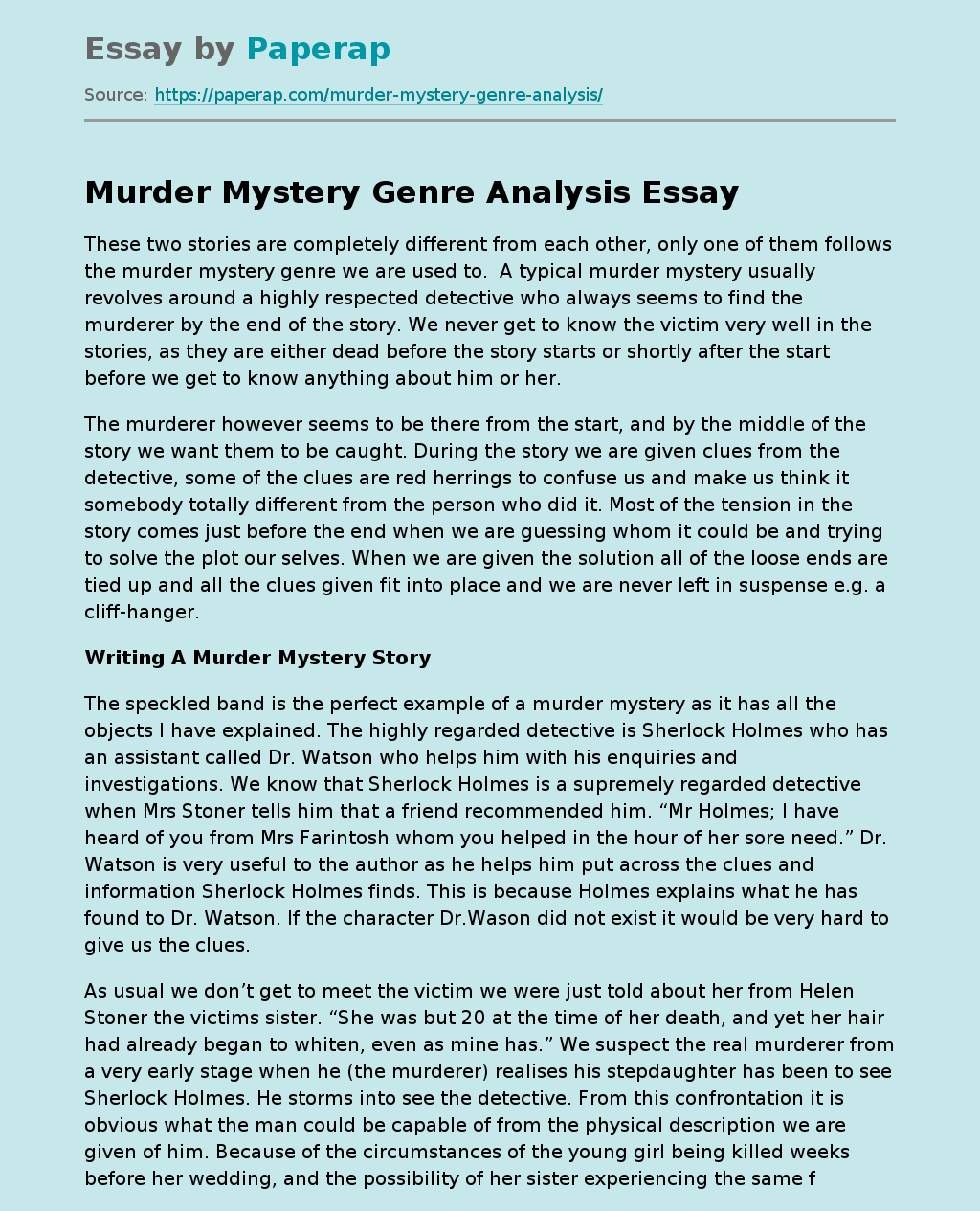Murder Mystery Genre Analysis
These two stories are completely different from each other, only one of them follows the murder mystery genre we are used to. A typical murder mystery usually revolves around a highly respected detective who always seems to find the murderer by the end of the story. We never get to know the victim very well in the stories, as they are either dead before the story starts or shortly after the start before we get to know anything about him or her.
The murderer however seems to be there from the start, and by the middle of the story we want them to be caught. During the story we are given clues from the detective, some of the clues are red herrings to confuse us and make us think it somebody totally different from the person who did it. Most of the tension in the story comes just before the end when we are guessing whom it could be and trying to solve the plot our selves.
When we are given the solution all of the loose ends are tied up and all the clues given fit into place and we are never left in suspense e.g. a cliff-hanger.
Writing A Murder Mystery Story
The speckled band is the perfect example of a murder mystery as it has all the objects I have explained. The highly regarded detective is Sherlock Holmes who has an assistant called Dr. Watson who helps him with his enquiries and investigations. We know that Sherlock Holmes is a supremely regarded detective when Mrs Stoner tells him that a friend recommended him.
“Mr Holmes; I have heard of you from Mrs Farintosh whom you helped in the hour of her sore need.” Dr. Watson is very useful to the author as he helps him put across the clues and information Sherlock Holmes finds. This is because Holmes explains what he has found to Dr. Watson. If the character Dr.Wason did not exist it would be very hard to give us the clues.
As usual we don’t get to meet the victim we were just told about her from Helen Stoner the victims sister. “She was but 20 at the time of her death, and yet her hair had already began to whiten, even as mine has.” We suspect the real murderer from a very early stage when he (the murderer) realises his stepdaughter has been to see Sherlock Holmes. He storms into see the detective. From this confrontation it is obvious what the man could be capable of from the physical description we are given of him. Because of the circumstances of the young girl being killed weeks before her wedding, and the possibility of her sister experiencing the same fate the reader unconsciously sympathetic and anticipates the murderer being discovered.
The speckled band yet again shows how typical it is to the murder mystery genre by the clues and the red herrings that are given in the story. For example, some of the clues are; the discovery of the ventilator that adjoined the two rooms, the realisation that the bell pull was fake, and the detection of the bed being fixed to the floor. The fact that there was a gypsy camp near by was meant to ply the readers ideas into thinking that the gypsies responsible some way. Another red herring given was the mention of the cheetah and the baboon that the stepfather kept as pets.
At the end of the mystery the murderer is revealed, all the clues are solved, and the plot is explained in full leaving a very tidy ending and the reader fully satisfied with the conclusion. Lamb to the Slaughter is a completely different murder fiction, we are told the story from the murderer’s point of view, and we sympathise with her account of the circumstances. This is because at the start of the story she’s genuinely looking forward to her husband coming home. She’s oblivious to the fact of devastating news he is going to give her. (Bad enough for her to kill him) As the detectives search for the murder weapon we are curious to know whether she will get away with it. At the end while the detectives are eating the murder weapon black humour is used as the story is funny in a morbid sense. We also find black humour in the tittle as it is literally true.
The end of the story is different to that of The Speckled Band because the reader is left in suspense and we will never really know the outcome of any further enquires. Another aspect that differs in the two stories is the language used in each. In The Speckled Band the language is very old fashioned and sometimes difficult to understand, some of these words are: ‘defray’ which means – Make good, repay, ‘would fain’ that means – would like to, and ‘apertve’ which means – opening. Roald Dahl however uses language that we are much more used to reading in the Lamb to the Slaughter.
Murder Mystery Genre Analysis. (2019, Dec 05). Retrieved from https://paperap.com/murder-mystery-genre-analysis/

